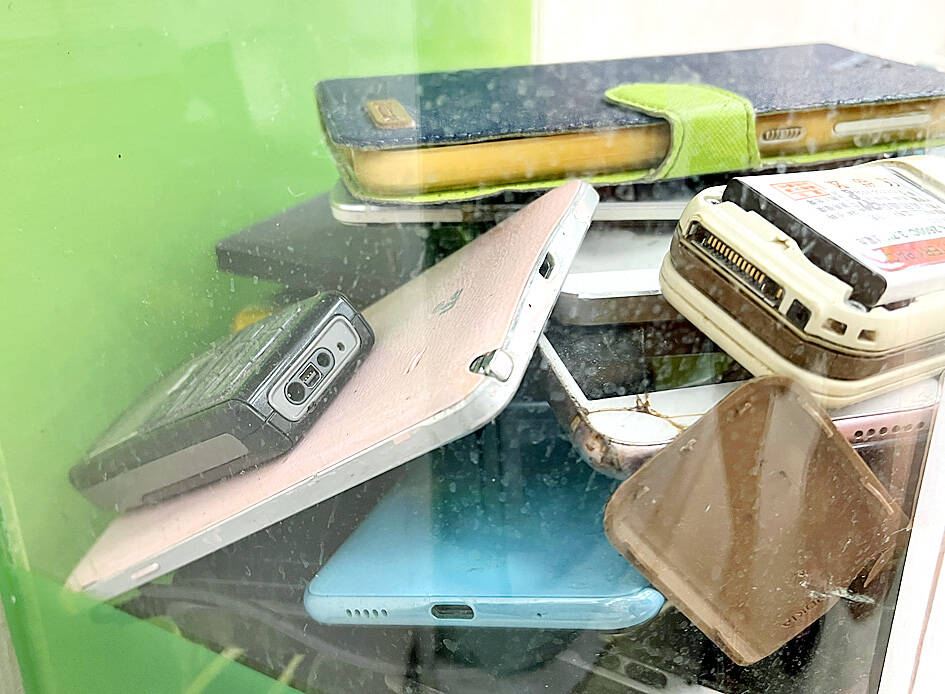The government is aiming to raise the recycling rate of mobile phones to 30 percent by 2030, the Ministry of Environment said at a panel discussion yesterday.
Although more than 6 million smartphones are sold in Taiwan annually, only 12 percent were recycled last year because of their relatively smaller sizes and higher markup prices, ministry data showed.
The ministry’s surveys also showed that consumers do not want to recycle their smartphones because their personal information is stored on the devices.

Photo: Chen Chia-yi, Taipei Times
To raise the mobile phone recycling rate, the ministry said it is drafting a set of rules that would require mobile phone importers and manufacturers to install more recycling facilities, assist mobile phone users in deleting personal data and give consumers additional incentives to recycle.
“A mobile phone contains 70 types of chemical substances, and recycling mobile phones would allow these substances to be reused and reduce explosion risks of lithium batteries. About 220,000 kilowatt-hours of electricity would be conserved if 10,000 mobile phones were recycled, which would translate to a reduced carbon emission of about 140 tonnes,” the ministry said.
The rules, which are stipulated based on the Resource Recycling Act (資源回收再利用法), would clearly list recycling an obligation of mobile phone importers and manufacturers, Resources Circulation Administration Deputy Director Wang Yeuh-bin (王嶽斌) said.
Mobile phone retailers should establish different channels for recycling, Wang said.
Business operators would be obligated to submit before March 31 every year information regarding their mobile phone recycling rates for the previous year, he said.
They would be asked to submit a plan to increase the recycling rate if they fail to reach the goal, he added.
“Our goal is to enhance the nation’s mobile phone recycling rate to at least 15 percent by 2025 and 30 percent by 2030,” Wang said, adding that the ministry would begin enforcing the rules next year.

Taiwan’s Liu Ming-i, right, who also goes by the name Ray Liu, poses with a Chinese Taipei flag after winning the gold medal in the men’s physique 170cm competition at the International Fitness and Bodybuilding Federation Asian Championship in Ajman, United Arab Emirates, yesterday.

Costa Rica sent a group of intelligence officials to Taiwan for a short-term training program, the first time the Central American country has done so since the countries ended official diplomatic relations in 2007, a Costa Rican media outlet reported last week. Five officials from the Costa Rican Directorate of Intelligence and Security last month spent 23 days in Taipei undergoing a series of training sessions focused on national security, La Nacion reported on Friday, quoting unnamed sources. The Costa Rican government has not confirmed the report. The Chinese embassy in Costa Rica protested the news, saying in a statement issued the same

A year-long renovation of Taipei’s Bangka Park (艋舺公園) began yesterday, as city workers fenced off the site and cleared out belongings left by homeless residents who had been living there. Despite protests from displaced residents, a city official defended the government’s relocation efforts, saying transitional housing has been offered. The renovation of the park in Taipei’s Wanhua District (萬華), near Longshan Temple (龍山寺), began at 9am yesterday, as about 20 homeless people packed their belongings and left after being asked to move by city personnel. Among them was a 90-year-old woman surnamed Wang (王), who last week said that she had no plans

TO BE APPEALED: The environment ministry said coal reduction goals had to be reached within two months, which was against the principle of legitimate expectation The Taipei High Administrative Court on Thursday ruled in favor of the Taichung Environmental Protection Bureau in its administrative litigation against the Ministry of Environment for the rescission of a NT$18 million fine (US$609,570) imposed by the bureau on the Taichung Power Plant in 2019 for alleged excess coal power generation. The bureau in November 2019 revised what it said was a “slip of the pen” in the text of the operating permit granted to the plant — which is run by Taiwan Power Co (Taipower) — in October 2017. The permit originally read: “reduce coal use by 40 percent from Jan.